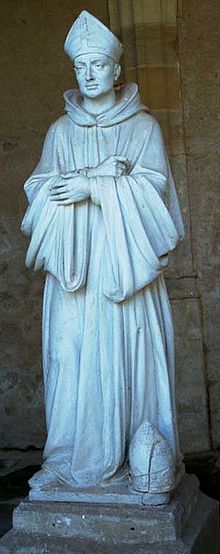- Majolus of Cluny
-
Saint Majolus of Cluny Born ~906
Avignon (sometimes stated as Valensole)Died May 11, 994
SouvignyHonored in Roman Catholic Church Feast May 11 Saint Majolus of Cluny (Maieul, Mayeul, Mayeule) (ca. 906 – May 11, 994) was an abbot of Cluny. As a youth Majolus fled his family's estates near Rietz to stay with relatives at Mâcon due to the Muslim invasions. Majolus studied at Lyon and later became archdeacon of Mâcon.
 Statue of Majolus, Souvigny.
Statue of Majolus, Souvigny.
Offered the bishopric of Besançon, he became a monk of Cluny instead. In 954, he was named abbot-coadjutor to Aymard. Two years later, he became full abbot of Cluny.
At several times, he refused the papacy.
Majolus, along with his successor Odilo of Mercouer, were supporters of the Ottonian emperors of Germany.[1] He reformed many German monasteries at the request of Otto the Great and settled a disagreement between Adelaide and her son, Otto II.
The Andalusians of Fraxinet in Provence captured Majolus in 972 as he crossed the Saint Bernard Pass. Majolus was ransomed by the monks of Cluny for a thousand pounds of silver.[2] This outrage upon the greatest monk in the Christian West was followed by the extermination of Fraxinet by the lords of Provence in 975.
During his abbacy the replacement abbey church of Cluny (Cluny II) was consectrated in 981.
Shortly before his death, he made Saint Odilo his coadjutor. Majolus died while on his way to Saint-Denis.
Veneration
In 1793 his relics, together with those of Odilo, were burned by the revolutionaries "on the altar of the fatherland".
Notes
- ^ R. Oursel, Romanesque (Taschen, 1967) p. 52
- ^ Saint Patrick's Church: Saints of May 11
External links
Categories:- Cluniacs
- 900s births
- 994 deaths
- 10th-century Christian saints
- Medieval French saints
- Frankish saints
- French saint stubs
Wikimedia Foundation. 2010.
